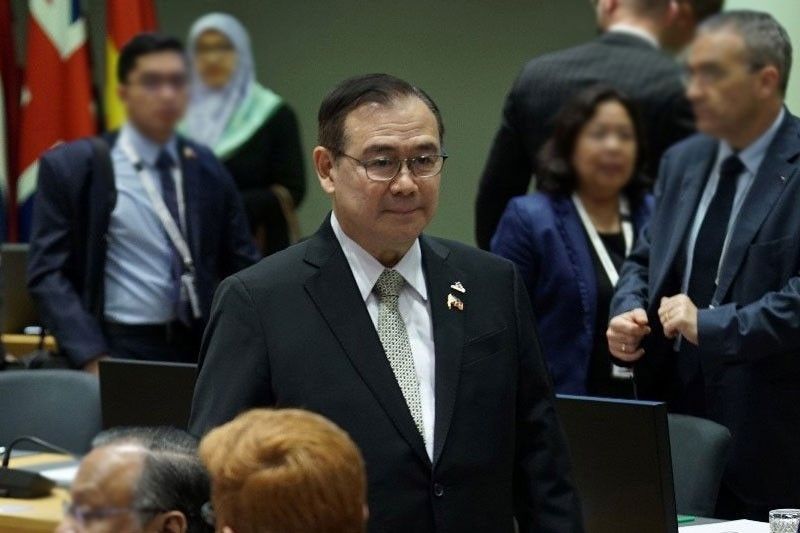YearEnder: Fallout between old friends; traditional ties reaffirmed

MANILA, Philippines — It was a year of antagonism toward old friends as well as reaffirmation of traditional friendships for Philippine foreign relations.
The government’s vicious war on drugs has tainted the country’s image in the international community and reaped condemnation from influential personalities and major institutions like the European Union.
In July, 18 of 47 member-countries of the United Nations Human Rights Council (UNHRC) voted in favor of a resolution that sought a comprehensive report on the human rights situation in the Philippines amid allegations of thousands of extrajudicial killings of suspected drug offenders. Iceland proposed the resolution at the 41st session of the UNHRC in Geneva.
Fourteen member-states – including China – voted against the resolution, while 15 abstained.
The resolution, dismissed by the Duterte administration as “tiny majority-approved and one-sided,” also urges the government to cooperate with UN agencies that would be involved in any probe.
Foreign Affairs Secretary Teodoro Locsin Jr. made it clear, however, that any investigation stipulated in the ruling won’t be allowed, as even the holy spirit is “100 percent in favor” of the Philippines’ war on drugs.
He also raised the possibility of the country withdrawing from the UNHRC, but later clarified it won’t severe relations with the institution or with any other nation.
He expressed his contempt at France and other Western countries for supporting the Iceland-initiated resolution.
“The ones who don’t take daily showers already invented their facts; the Queen in Alice: ‘First the judgment then the trial.’ They’re not gonna change fantasy for the truth. Too much trouble. They’d have to exhume at least 5,000 bodies not to say 27,000 as falsely claimed,” Locsin said on Twitter.
Rome Statute withdrawal
Earlier, the Philippines withdrew from the Rome Statute, the founding treaty of the International Criminal Court (ICC). Its withdrawal became effective on March 17, 2019.
But ICC Prosecutor Fatou Bensouda announced that the ICC’s preliminary examinations into the situation in the Philippines would continue and that the court retains its jurisdiction over crimes committed in the context of the “war on drugs.”
Her announcement came after Malacañang said that ICC representatives would be barred from entering the Philippines if they insist on investigating alleged extrajudicial killings tied to the war against illegal drugs. The number of deaths linked to the administration’s anti-drug campaign has reached thousands since Duterte assumed the presidency in 2016.
The antagonism between foreign affairs officials and diplomats from countries deemed critical of the drug war was palpable even at social functions.
In a tweet in October, Locsin admitted that he had prohibited representatives of his department from attending the celebrations of countries that favored the Iceland resolution.
No representative of the Department of Foreign Affairs (DFA) showed up for the traditional diplomatic toast at the celebration of Bastille Day, the French National Day, on July 14 at the official residence of the French ambassador in Forbes Park, Makati.
Sources said the French embassy was informed by the DFA that no one from the department would be available for the Bastille Day celebration.
French Ambassador Nicolas Galey said France’s co-sponsoring the Iceland resolution is not the “alpha and omega” of international relations and should not put in danger the friendship between the two countries.
There was a DFA representative, however, at the German Unity Day in October.
Foreign Affairs Undersecretary for policy Enrique Manalo represented the Philippines at the event and even offered the traditional toast with German Ambassador Anke Reiffenstuel. France and Germany are co-sponsors of the Iceland-initiated resolution.
Locsin showed up in November at the Czech Republic’s 30th Velvet Revolution anniversary that he called “one of the most fun national days ever.”
Earlier in February, the German foreign ministry summoned the acting Philippine ambassador to Germany after Locsin made “totally unacceptable” remarks regarding the Holocaust.
He had dismissed as “metaphor” Duterte’s comparing his bloody war on drugs to Nazi leader Adolf Hitler’s killing of six million Jews.
Locsin defended his comments, saying Hitler’s massacre of Jews was “historical fact.”
Closer to home, the DFA had to deal with a potentially hostile scenario with China after a Chinese vessel rammed and sank a Filipino fishing boat in the vicinity of Recto (Reed) Bank in the West Philippine Sea on the night of June 9.
After ramming the Filipino boat F/B Gem-Ver 1, the Chinese hurriedly left without rescuing the fishermen. A Vietnamese fishing boat later rescued the 22 distressed Filipinos.
Locsin denounced the Chinese abandonment of the distressed fishermen in a speech at the 25th anniversary of the coming into force of the United Nations Convention on the Law of the Sea (UNCLOS).
He said the “duty to render assistance” is enshrined in international law and in the International Maritime Organization (IMO)’s International Convention for the Safety of Life at Sea and the IMO Convention on Maritime Search and Rescue.
The Recto Bank incident prompted the DFA to file a diplomatic protest against China.
In August, the owner of the Chinese ship finally apologized to the 22 Filipino fishermen for the collision and “unintentional” mistake.
Locsin clarified that the apology relayed to Filipino fishermen by the owner of the Chinese vessel was “merely noted” and not accepted.
He also clarified in the same tweet that presidential spokesman Salvador Panelo “merely expressed satisfaction with the Chinese apology for the incident and the offer of compensation and nothing more.”
Swarming Pag-asa
The DFA again “fired off” a diplomatic protest against Beijing in response to the “swarming” of Chinese vessels around Pag-asa Island.
China assured the Philippines that it has always been “a builder of world peace, contributor to global development and defender of international order.”
China also called itself a “role model” in international rules compliance.
Earlier in March, former foreign affairs chief Albert del Rosario and former ombudsman Conchita Carpio-Morales filed with the International Criminal Court (ICC) a complaint against Chinese President Xi Jinping in connection with China’s environmentally destructive activities in the South China Sea, particularly its building of artificial islands.
They said China’s “atrocious” actions in the South China Sea and in Philippine waters constitute a crime against humanity. Both officials were later barred from entering Hong Kong for unspecified reasons.
The ICC later said it did not act on the complaint filed by the two former officials, for lack of jurisdiction.
But Del Rosario and Morales explained the ICC decision was not a dismissal of their complaint but a call for “new facts and evidence.”
Meanwhile, the US assured the Philippines of its commitment to the 1951 Mutual Defense Treaty (MDT) despite President Duterte’s much-vaunted “pivot to China” and “separation” from the US.
- Latest
- Trending






























